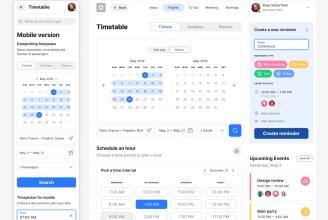Drupal: The Best Choice for Portals, Websites, and Dashboards
In today's digital age, having an effective online presence is more important than ever before. Whether you're running a business, managing an organization, or just trying to share your message with the world, a well-designed website, portal, or dashboard can make all the difference. But with so many different tools and platforms available, how do you choose the right one for your needs? In this blog post, we'll take a closer look at why Drupal is a must-have for developing effective portals, websites, dashboards, and more.
What is Drupal and why is it important?
Drupal is a free, open-source content management system (CMS) that has been around since 2001. It's built on PHP and MySQL, and is designed to be modular, flexible, and extensible. One of the key benefits of Drupal is that it can be used to build almost any type of website or application, from simple blogs to complex enterprise portals. Some of the main reasons why Drupal is so popular include its scalability, security, and community support.

Drupal's key features and benefits
Drupal has a wide range of features and benefits that make it an ideal choice for developing portals, websites, dashboards, and more. These include:
Modular architecture:
Drupal's modular architecture allows you to choose the features and functionality that you need, without having to install everything at once. This can help to keep your site fast, secure, and optimized for performance.
Flexible theming system:
Drupal's theming system allows you to easily customize the look and feel of your site, without having to write any code. You can choose from thousands of free and premium themes, or create your own from scratch.
Powerful content management tools:
Drupal has a powerful content management system that allows you to create and manage all types of content, including pages, articles, images, videos, and more. You can also create custom content types and fields to suit your specific needs.
User authentication and access control:
Drupal has robust user authentication and access control features, allowing you to create secure portals and dashboards that are only accessible to authorized users.
Personalized dashboards:
Drupal's user profile and dashboard system allows you to create personalized dashboards for your users, displaying relevant content and information based on their preferences and activity.
Scalability and performance:
Drupal is designed to be scalable and performant, even for large-scale sites with millions of visitors. It can handle high traffic volumes and complex queries with ease, making it an ideal choice for enterprise portals and complex web applications.
How Drupal can be used to develop effective portals?
One of the key strengths of Drupal is its ability to be used for portal development. A portal is a website or application that provides access to a variety of services and information, often in a single location. Some examples of portals include intranets, extranets, social networks, and e-commerce sites. Drupal can be used to develop effective portals by providing a range of features and functionality, including:
- User authentication and access control: Drupal's user authentication and access control features allow you to create secure portals that are only accessible to authorized users.
- Personalized dashboards: Drupal's user profile and dashboard system allows you to create personalized dashboards for your users, displaying relevant content and information based on their preferences and activity.
- Content management: Drupal's powerful content management system allows you to create and manage all types of content, including pages, articles, images, videos, and more. You can also create custom content types and fields to suit your specific needs.
- Integration with third-party services: Drupal can be integrated with a wide range of third-party services, including social media platforms, e-commerce platforms, and more.
Case study:
To further demonstrate the effectiveness of Drupal in portal development, let's take a look at some real-world examples:
- The Australian Government: The Australian Government's website is built using Drupal, and serves as a portal for all government-related services and information. The website is highly secure and provides a user-friendly interface for citizens to access various government services.
- The Weather Channel: The Weather Channel's website is another example of Drupal's capabilities in portal development. The website provides users with up-to-date weather information, as well as personalized weather alerts and a range of other features.
- The State of Georgia: The State of Georgia's website is built using Drupal, and serves as a portal for all state-related services and information. The website is highly secure and provides citizens with access to a range of services, including tax information, business services, and more.

How Drupal can be used to develop effective websites and dashboards?
In addition to its capabilities in portal development, Drupal can also be used to develop effective websites and dashboards. Some of the key benefits of using Drupal for these purposes include:
- Flexibility: Drupal's modular architecture and flexible theming system allow you to easily customize the look and feel of your website or dashboard, without having to write any code.
- Content management: Drupal's powerful content management system allows you to create and manage all types of content, including pages, articles, images, videos, and more.
- User authentication and access control: Drupal's user authentication and access control features allow you to create secure websites and dashboards that are only accessible to authorized users.
Scalability and performance: Drupal is designed to be scalable and performant, even for large-scale websites and dashboards with millions of visitors.
Conclusion and final thoughts
In conclusion, Drupal is a must-have for developing effective portals, websites, dashboards, and more. Its modular architecture, flexible theming system, powerful content management tools, and robust user authentication and access control features make it an ideal choice for a wide range of applications. Whether you're a small business owner, a government agency, or a large enterprise, Drupal can help you to build a powerful online presence that engages your audience and achieves your goals. So why not give it a try?


